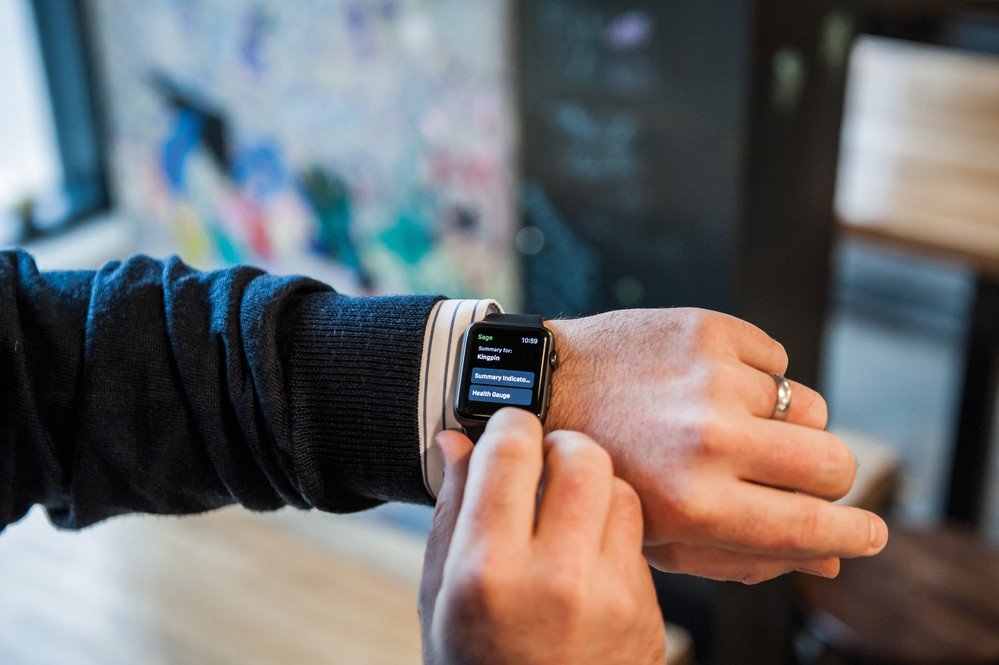Technology & Innovation
Wearable technology is changing the accounting industry

The Apple Watch is for breezing through airports with your boarding pass a wrist-based prod away. For opening your hotel room with a wink and a kiss of sapphire glass on lock. Unlocking your all-electric BMW supercar and checking its charge at a tap, right?
Well. Yes. Of course it’s all these things in Apple’s carefully-controlled marketing machine, but wearable technology is also making inroads into surprising creative and business areas, with accounting lining up to be one of those surprises.
And it’s not just Apple’s halo product accountants are buckling on with their fancy dan straps, Google’s Android Wear wearable OS is providing excellent tools for Motorola, Samsung, Sony and LG smartwatches.
But there’s no doubting the fact that this is still a nascent technology with limited support for the finance industry and therefore, it would appear, limited appeal above the early adopter “want” factor. Bear in mind that wearables, certainly at this point in time, are essentially glorified notification devices attached to your body. That also tell the time.
Smaller accountancy firms
The advantage here, however, goes to smaller accountancy firms. The big four will spend years doing over-complicated due diligence and achieving sign off by innumerable layers of IT and management bureaucracy. This allows fleet of foot, tech-savvy companies to get in at the ground level and start streamlining and automating their workflow right away.
One of the first providers on the scene that’s hoping to convince our traditionally conservative industry to act otherwise is Receipt Bank, with their Practice Platform app – the first to land on the Apple Watch. And although you’ll be unsurprised to hear that it’s more a support app that does little heavy lifting, its advantages are clear.
From offering real time metrics including estimating bookkeeping time outstanding per client, to prioritising clients whose deadlines are approaching and identifying which client data is up to date, it could be a vital tool for busy, tech-savvy accountants. Indeed, let’s focus in on that last one.
To clarify, the app identifies which clients are submitting data and are up to date, understand how long clients are sitting on receipts and invoices before submitting them, detecting transactions that do not have supporting documentation and highlight the number of items submitted after an accounting period has closed.
All these factors are absolutely key to providing a good service to your clients, and having these metrics highlighted and sent to your wrist via notification is both vital and, you know, cool.
What does the industry think?
Well, co-founder of the app developer Receipt Bank Michael Wood certainly thinks so. “Access to metrics through wearables will enable professionals to run their most efficient practice, on-the-go and in real time,” Wood told Accountancy Live.
“Firms are calling for ways to increase productivity. It was their feedback that inspired us to develop Practice Platform.”
And wearable adopters seem to agree. We spoke to Keith Bailey, a Financial Controller with over 17 years experience in large corporate and SME environments in consulting & IT & Telecoms sectors. Past clients have included Adidas, Bank of America, Barclays, Disney, The Economist, IBM, Sainsbury’s and Tesco amongst many others.
Keith has been one of the first to adopt wearables into his day-to-day regime and, with the right tweaking, has found them invaluable: “It’s enormously useful to have a handle on client timekeeping for billables and at-a-glance information on deadlines.
“Plus, my schedule, emails and important messages come straight to my wrist, with priority tasks responded to immediately and less important notifications dismissed with a swipe.”
Kevin Roberts, Director of Platform Technology at finance app developer FinancialForce.com agrees: “We’re seeing huge amount of design and development effort being invested in wearable devices,” he told us.
“And the focus is on how best to provide useful and timely information while avoiding constant interruption. In a business context that would seem something much needed at the moment.”
Monitoring business health in real time through data crunching is what apps do effortlessly and dependably. The key, however, comes in prioritising the key notifications while editing out the white noise.
Unexpected, unseen advantages
There are unexpected, unseen advantages to the incorporation of wearable technology, too. A survey by The Human Cloud at Work: an experimental design research collaboration between the Institute of Management Studies (IMS) at Goldsmiths, University of London and Rackspace, the open cloud company, and reported by CNN demonstrated that the adoption of wearable technology increased productivity by 8.5% and job satisfaction by 3.5%.
While PwC found that 44% of employees would be happy to wear – and have their employer harvest data from – a wearable issued to them. Tesco have been using wearable devices in their depots since 2004 to track staff movement, figure out economies of scale and better plan personnel recruitment.
Of course, there’s more of interest to accountants with a wearable than pure finance software, iOS and Androidwear offer time management software and car mileage rate calculators to support client billing and the Apple Watch’s famously naggy fitness app will offer a polite buzz when it’s time to get up from your desk and get some blood flowing through your legs, as being sedentary is a huge issue for the financial industry.
When you add email, meeting and message notifications sent to your wrist saving you constant time, these products being to look hugely desirable. Plus, as a business expense, they can be written off, to boot. Sweet!
There’s a demerit list, obviously. But it’s the same with any finance tech. Be sure you’re happy with your software provider’s security online and offline. Do they store information on the Cloud? How is this encrypted and what security guarantees are given? Is your/their password security secure and robust? Have they been hacked recently/at all? What does your gut say?
Final word
To wrap up, then, wearables, like any other piece of consumer tech, however deliciously desirable are only as good as the software supporting them. If you think a watch with a two-inch screen of real estate is going to provide high levels of service, you need to have a word with yourself in a darkened room.
It’s evolutionary, not revolutionary.
But wearables can and will play as major a role in future accountancy set ups like tablets and smartphones before them. We’ll close, however, with one, last stat. An apadmi survey published earlier this year found that one-fifth of those surveyed felt that wearables made people “look intelligent and successful”. We’ll just leave that there…






Ask the author a question or share your advice